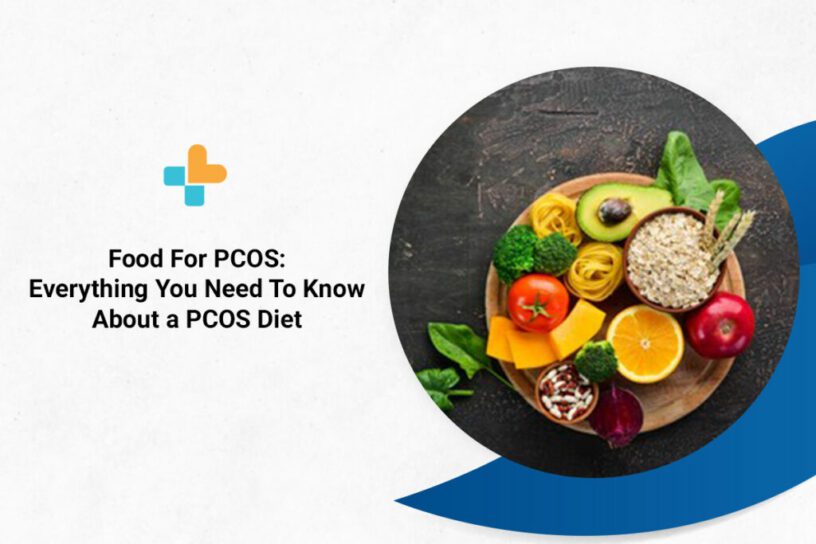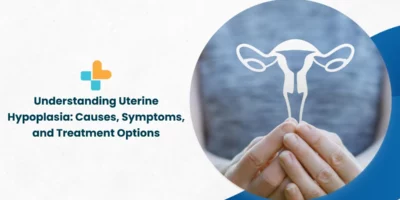Polycystic ovary syndrome, commonly known as PCOS, is a medical condition that induces issues with metabolism and hormonal imbalances. Furthermore, it has lately emerged as a common health condition, affecting 1 in 10 women. Yet, this condition remains misunderstood or misdiagnosed, leading countless women to suffer in silence. So whether you have been suffering from PCOS for years or have just been diagnosed with PCOS, several things can assist in managing and relieving symptoms, including nutrition-rich food for PCOS and bioidentical hormone replacement therapy.
And according to research, a well-balanced, nutritionally rich diet can help lower the damaging impacts of PCOS. However, before switching to the PCOS diet plan, you must consult your hormone specialist for specific suggestions.
Since PCOS is a hormonal condition, there can never be one solution that works for everyone, and patient-specific testing can assist in determining the right diet for you. Keep reading below to learn more about high-fiber foods for PCOS.
How does Diet Affect PCOS?
While nutrition and diet might not be the only solution, research has indicated that if patients with PCOS (Polycystic ovary syndrome) lose weight, their condition can improve. Hence, it might not be wrong to say that nutrition and diet play a crucial part in weight management. Thus, paying close attention to your diet and consumption could relieve PCOS symptoms.
Women with this health disorder have discovered that a high-protein, low-carb diet is very useful for weight loss with PCOS. Nevertheless, it is not just about weight. The nutrients you take affect your hormone production and stress as there is a close link between PCOS and stress.
Therefore, we can say that consuming specific nutrients can assist in alleviating PCOS symptoms and stress at a hormonal level. Thus, when considering a PCOS fertility diet, it is necessary to evaluate every facet of your diet to ensure you’re consuming a balanced diet and maintaining plenty of variety, which can make nutritional eating manageable to adhere to in the long run.
Foods to Eat in PCOS Diet
Individuals with PCOS (Polycystic ovary syndrome) usually have higher insulin levels than normal people. Insulin is a crucial hormone produced in the pancreas and helps body cells metabolize sugar (glucose). Moreover, your blood sugar level increases if the body does not produce adequate insulin. It can even happen if your body has insulin resistance, indicating you cannot effectively consume the insulin your body produces.
In addition, if your body has insulin resistance, your pancreas might pump out higher levels to keep your blood sugar levels at the required levels. Excessively high insulin levels can drive your ovaries to produce more androgens, like testosterone.
Insulin resistance can make it more challenging to lose weight, which is why women with PCOS often experience this issue. A diet high in refined carbs, like sugary and starchy foods, can cause insulin resistance and, thus, make weight loss more challenging to handle. However, specific foods can relieve PCOS symptoms and help lose weight.
1. Fiber-Rich Foods
A fiber-rich diet presents numerous advantages to women with PCOS, such as lower insulin levels and increased antioxidants to reduce inflammation and improve gut bacteria. Moreover, a fiber-rich diet includes the following:
- Legumes (black beans, lentils, chickpeas)
- Seeds (chia, flax, sunflower seeds
- Berries (blackberries, raspberries, blueberries)
- Whole Grains (bulgur, brown rice, quinoa, whole oats)
Moreover, a fiber-rich diet is a good call regardless of your diet. These foods are low in calories and nutrient-rich, making them ideal for nutrition and weight loss.
Nevertheless, green leafy vegs, such as spinach or kale, comprise increased levels of Vitamin B for women with PCOS. In addition, more than 80% of women who suffer from PCOS lack vitamin B! This specific vitamin remains associated with many PCOS symptoms, including:
- Hirsutism (excess hair growth)
- Insulin Resistance
- Irregular Periods
- Obesity
- Difficulty Conceiving
2. Lean Protein
Consuming lean protein (compared to meat higher in saturated fat, like cured meats and red meat) may assist in weight loss and hold you fuller for an extended time. Moreover, lean meats usually consume the following:
- Plant protein sources (peas, beans, tofu, tempeh)
- Fish (salmon, tuna, shrimp, cod)
- Lean poultry (skinless chicken and turkey)
Consuming lean meat is important for any nutritious diet, and although it may be more expensive than its high-fat options, this additional expense can be well worth it. It is particularly true for women with PCOS, who may find weight loss more challenging due to hormonal fluctuations.
In addition, consuming grass-fed, organic meat is just as essential as monitoring the fat content of your meals. Non-organic meat generally comprises increased livestock hormones, which can directly affect human hormone levels. On the contrary, organic meat generally has fewer animal hormones, making it safer to consume if you are experiencing PCOS or hormonal imbalance.
Furthermore, there are numerous beneficial fats that you can relish in your nutritious diet, from oily fish to avocados, and these are exceptionally crucial for consuming with PCOS. It might not be wrong to say that nutritious fats are a source of important fatty acids, essential components in supporting cell walls. Apart from this, these fatty acids play a pivotal role in properly balancing your hormones and managing your weight.
One exceptionally significant concern for females undergoing PCOS is pregnancy and fertility, and fatty acids play a key part in improving the odds of pregnancy and reducing infertility. Additionally, Omega 3, a fatty acid, is usually found in fish or flax seeds and assists in:
- Lower your body’s sensitivity to prolactin, a hormone that can hinder ovulation
- Regulate Hormones
- Improve blood flow to the uterus
- Assist in regulating your menstrual cycle
- Improve egg white cervical mucus, which aids sperm reach the egg
All of this assists in increasing your odds of getting pregnant, and once you are pregnant, essential fatty acids continue to play a considerable role. For example, they help sustain a wholesome nervous system and circulatory system!
3. Antioxidants Foods
Since women with PCOS have been shown to have elevated inflammatory signals and low-grade inflammation, it can raise insulin, adding to the worsening of PCOS symptoms. However, consuming food rich in antioxidants can reduce inflammation and keep insulin levels in check. Some of the foods rich in antioxidants are as follows:
- Whole Grains (whole oats, whole wheat, quinoa, brown rice)
- Vegetables (spinach, artichokes, kale)
- Fruits (strawberries, raspberries, blueberries)
- Unsaturated fats (nuts like butter, pecans, olive oil, avocado)
Women with PCOS (Polycystic ovary syndrome) have been shown to hold an increased level of oxidative stress, which can get battled by consuming increased levels of antioxidants in their diet. When picking these foods, it is essential to classify them according to their glycaemic index (GI), as there are some fruits to avoid in PCOS that are known to increase blood sugar levels which can have implications for diabetes induced by PCOS. Furthermore, the food rich in antioxidants comprises blueberries, Goji Berries, dark chocolate, and pecans, all of which have increased antioxidants. While these foods are essential for a nutritious diet in any situation, if you have PCOS, they take on even more significant importance.
4. Organic Whole Soy Foods
While organic whole soy has proven to enhance fertility in women with PCOS, it must remain organically grown and not highly processed.
- Miso
- Edamame
- Tempeh
Likewise, women suffering from PCOS are four times more likely to have type 2 diabetes, and organic whole soy foods contain high levels of fiber which can assist in managing insulin levels.
Foods to Avoid with PCOS
When taking a nutrition-rich diet to alleviate PCOS symptoms, you would want to avoid some of these worst foods for PCOS that can increase blood sugar, boost inflammation, and induce weight gain.
- Refined carbohydrates, such as mass-produced pastries and white bread.
Women on the PCOS spectrum do not generally process carbohydrates accurately, which is why refined carbohydrates are foods you must avoid with PCOS. In addition, restricting carbohydrates, particularly nutrient-void, refined carbohydrates, can assist in weight loss, which in turn reduces androgen levels responsible for abnormal hair growth, acne, an irregular menstrual cycle, or anovulation.
- Fried foods, such as fast food.
Besides being high in cholesterol and unhealthy, fried foods contain numerous harmful chemicals that can increase your body weight.
- Sugary beverages, such as sodas and energy drinks.
While you might think juice and smoothies are beneficial, some pre-bottled alternatives can comprise roughly 30 grams of sugar and increase your blood sugar level, which is a severe issue if you have increased insulin levels. Therefore, it is best to avoid concentrated sugars and sweets, like fruit juice—instead, pick natural sugars, like fruits.
- Processed meats like hot dogs, sausages, and luncheon meats.
Processed meats usually have an increased Glycaemic Index (GI), directly related to diabetes and insulin production. As already specified, women with PCOS have higher odds of developing diabetes, so it is essential to avoid high GI foods, which will probably end in causing a spike in your blood sugars.
- Solid fats, including margarine, shortening, and lard.
Foods that comprise saturated or hydrogenated fats comprise dairy by-products such as cheese or cream, fatty red meats, and fried or processed foods. These unhealthy fats can boost estrogen production, aggravating your PCOS symptoms and leading to excess weight gain, which can also exacerbate PCOS symptoms.
- Excess red meat, such as steaks, hamburgers, and pork.
Excess or overly processed red meat is not advantageous for weight loss or a nutritious, balanced diet. In addition, these red meat is generally high-fat food that can also be challenging for PCOS patients. Therefore, it is advisable to concentrate more on healthy fats, as in the Mediterranean diet (and you can consume as much whole-grain avocado toast as you like).
The Bottom Line
Now that you have the list of food to avoid and consume handy, you might be thinking, ‘What Next’? Before anything else, the most crucial thing to do is speak to professional experts about your alternatives.
Many women diagnosed with PCOS will be recommended to adjust their diet. However, note that women with PCOS might also be given other alternatives to run alongside these modifications. Hence, seeking professional advice and exploring all your options from a medical viewpoint is recommended.
Our Hospital Locations
Gynaecology Surgery Hospitals in Chandigarh | Gynaecology Surgery Hospitals in Bangalore | Gynaecology Surgery Hospitals in Jaipur | Gynaecology Surgery Hospitals in NCR | Gynaecology Surgery Hospitals in Hyderabad
Our Doctors
Gynaecology Surgery Doctors in Chandigarh | Gynaecology Surgery Doctors in Bangalore | Gynaecology Surgery Doctors in Jaipur | Gynaecology Surgery Doctors in NCR | Gynaecology Surgery Doctors in Hyderabad




